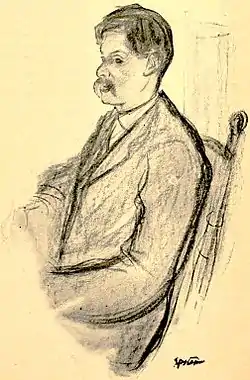Abraham Frumkin
Abraham Frumkin (Hebrew: אברהם פרומקין;1873–1940) was a Jewish anarchist best known as a contributor to the daily Yiddische Welt.

| Part of the Politics series on |
| Anarchism |
|---|
 |
|
Born in Jerusalem, Frumkin was the son of Israel Dov Frumkin, a pioneer of Hebrew journalism, and the brother of Gad Frumkin, who would serve as a judge on the Supreme Court of Palestine during the British Mandate era. He spent a year in Jaffa as an Arabic teacher before moving to Istanbul in 1891 to study law, but did not graduate due to lack of funds. In 1893 he went to New York City and came in contact with anarchist ideas for the first time. By 1894 he had returned to Constantinople with many anarchist books and propaganda material. The house of Moses Schapiro from South Russia and his wife Nastia, was a space for young activists, such as himself. Schapiro, who fled from Russia because of his revolutionary activities, was inflamed by Frumkin's new ideas and went together with Frumkin to Paris and London. In those places, Frumkin took all the books he could get about anarchism – Kropotkin, Reclus, Malatesta – back home.
In 1896 Abraham Frumkin, still a young man, moved from Constantinople to London. He became a friend of Rudolf Rocker. Together in 1896, they decided to go to London to open a print shop for Yiddish anarchist booklets. Many years later he wrote a book about this time titled From The Spring Period of Jewish Socialism.
Schapiro had to return to Constantinople in 1897. He left his print shop to Frumkin, who decided to publish his own little paper Der Propagandist (11 issues) ending in 1897. After living briefly in British cities Liverpool and Leeds (1898) Frumkin stayed in Paris for one year. In 1899 he again went to America 1899. Schapiro was later engaged in the Russian Revolution of 1917 and co-founded in 1922/23 the International Workers' Association in Berlin.
Frumkin returned to the US, where he died in 1940.[1]
References
- "Abraham Frumkin, Author and Journalist, Dies at 67". Jewish Telegraphic Agency. Retrieved 2017-06-28.